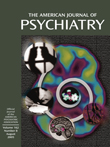Topiramate-Induced Psychosis
To the Editor: With the use of topiramate as a strategy for treatment-resistant bipolar disorder (1)—not to mention other off-label uses for conditions such as borderline personality disorder (2) and eating disorders (3)—clinicians need to be aware of the possibility of topiramate-induced psychosis in patients who have not previously had a psychotic episode. Although there is a small amount of literature in neurology journals regarding psychiatric adverse events in seizure patients (4), the psychiatric literature is largely silent on the subject (5). We report on a patient without a previous history of psychosis who developed psychosis after an increase in his dose of topiramate.
Mr. A was a 32-year-old man with obsessive-compulsive disorder who was initially administered 25 mg/day of topiramate for mood stabilization and weight loss. Eight months later, his dose was increased from 150 mg b.i.d. to 200 mg b.i.d. Within 1 week of the increase, he became paranoid, believed he was “the messiah,” and intended to sacrifice himself as directed by God. He also developed disorganized and illogical thought processes and a flattened affect. He appeared to be responding to internal stimuli. Mr. A was transferred to our care 2 months later, after having no improvement with a reduction in his dose of topiramate and the use of risperidone, 6 mg b.i.d. After discontinuation of topiramate, he became less paranoid and more organized, and his affect brightened. He improved continuously throughout the day, and within 24 hours, his psychosis had resolved.
The anticonvulsant topiramate is known to cause cognitive adverse events. Psychiatric adverse events reported in the neurology literature include paranoid delusions, visual and auditory hallucinations, depression, aggressive behavior, and irritability (4). In some case reports of patients with seizure disorder, a decrease in the dose of topiramate resulted in resolution of the psychosis (6). Although no controlled trials have shown topiramate to be adequate for mood stabilization, clinicians need be aware of adverse psychiatric events in patients taking topiramate and consider decreasing the dose or discontinuing the medication altogether.
1. Lykouras L, Hatzimanolis J: Adjunctive topiramate in the maintenance of treatment of bipolar disorders: an open-label study. Med Res Opin 2004; 20:843–847Crossref, Medline, Google Scholar
2. Cassano P, Lattanzi L, Pini S, Dell’Osso L, Battistini G, Cassano GB: Topiramate for self-mutilation in a patient with borderline personality disorder (letter). Bipolar Disord 2001; 3:161Crossref, Medline, Google Scholar
3. Hedges DW, Reimherr FW, Hoopes SP, Rosenthal NR, Kamin M, Karim R, Capece JA: Treatment of bulimia nervosa with topiramate in a randomized, double-blind, placebo-controlled trial, part 2: improvement in psychiatric measures. J Clin Psychiatry 2003; 64:1449–1454Crossref, Medline, Google Scholar
4. Mula M, Trimble MR: Topiramate and psychiatric adverse events in patients with epilepsy. Epilepsia 2003; 44:659–663Crossref, Medline, Google Scholar
5. Andrade C: Confusion and dysphoria with low-dose topiramate in a patient with bipolar disorder. Bipolar Disord 2001; 3:211–212Crossref, Medline, Google Scholar
6. Khan A, Faught E, Gilliam F, Kuzniecky R: Acute psychotic symptoms induced by topiramate. Seizure 1999; 8:235–237Crossref, Medline, Google Scholar



